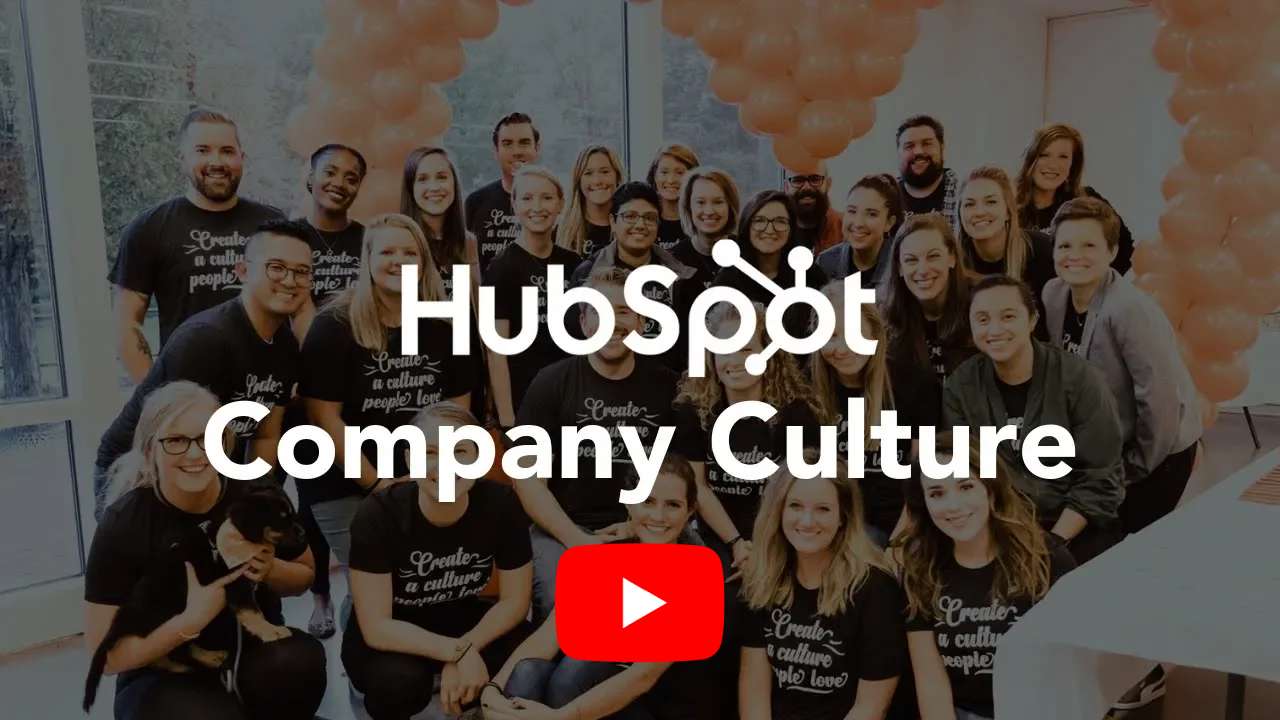In the world of tech, HubSpot stands out not just for its innovative CRM but for its deeply ingrained culture that has become a benchmark for companies worldwide.
With over 3,800 employees, 73,400 customers and recognition as one of Glassdoor's ‘Best Places to Work’, HubSpot doesn't just talk about culture; they live it, breathe it, and most importantly, measure it. "How do you turn company culture into a competitive advantage?"
Here’s the deck
Now we’ll get to how HubSpot does it:
The Genesis
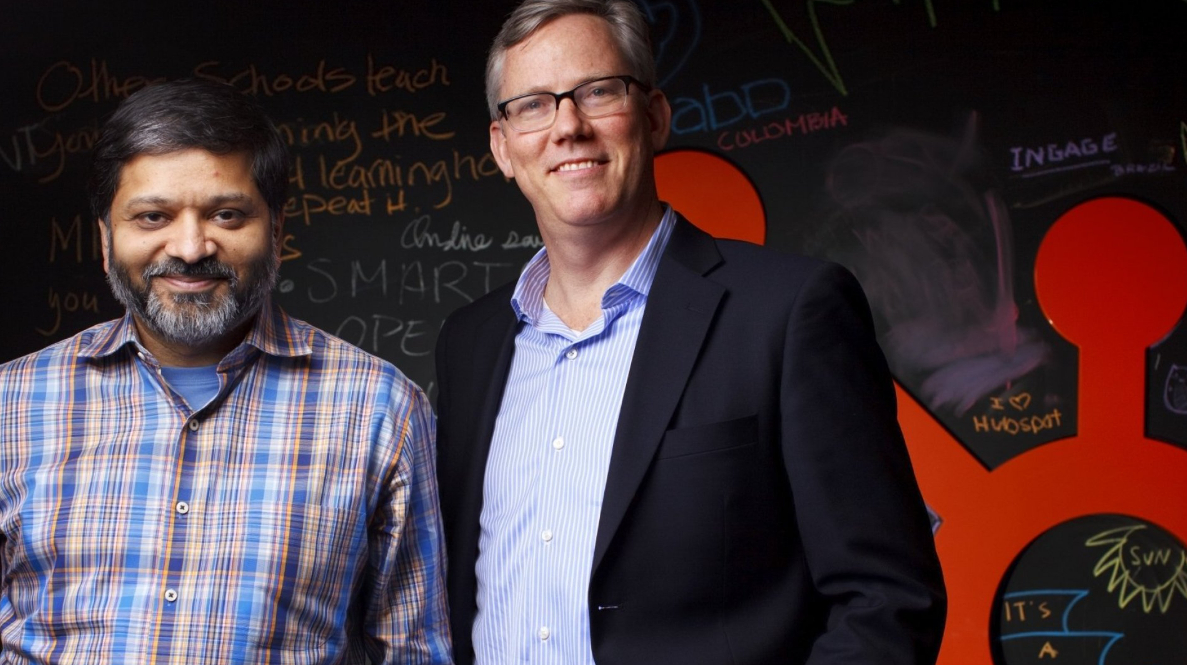
Dharmesh Shah, HubSpot's co-founder, invested around 200 hours into creating the Culture Code. This wasn't just a document but a manifesto that outlined the company's ethos, values, and operational blueprint.
Hubspot has a culture of amazing, growth-minded people whose values include using good judgment and solving for the customer. - Dharmesh Shah (Founder and CTO at HubSpot)
The Impact
Since its release, the Culture Code has not only guided HubSpot's internal practices but has also inspired businesses globally, amassing nearly 6 million views! And HubSpot itself has leveraged the Culture Code to foster a thriving work environment, driving innovation, collaboration, and employee engagement to unprecedented heights.
The HEART of HubSpot
Companies often tout their unique cultures as badges of honor, HubSpot's culture code has simplicity and depth. The HEART of HubSpot, has the values they hold dear: Humble, Empathetic, Adaptable, Remarkable, Transparent.

Humble
In a sector known for its brilliant minds and sometimes equally sizeable egos, humility might seem like an odd value to prioritize. Yet, HubSpot places it at the forefront. Humility fosters learning and growth. People who acknowledge that no matter how much you know, there's always more to learn recognize the contributions of others, ensuring that every success is a shared celebration, and every failure a shared responsibility.
Empathetic
Empathy at HubSpot is about understanding each other's feelings; and putting that understanding into action. Whether it's in dealing with colleagues or customers, empathy guides HubSpotters to make decisions that consider the impact on others.
It's what drives employees to solve for the customer or work together in a team by understanding everyone’s individual needs and challenges.
Adaptable
Tech tools and the industry itself is always changing, adaptability isn't just a nice-to-have; it's essential. HubSpot embraces change, It's about being comfortable with discomfort, knowing that the only constant in tech is change itself. Since being founded in 2006 the company refuses to stick to a set seating chart on a regular basis. The seating plan changes every 6-8 months.
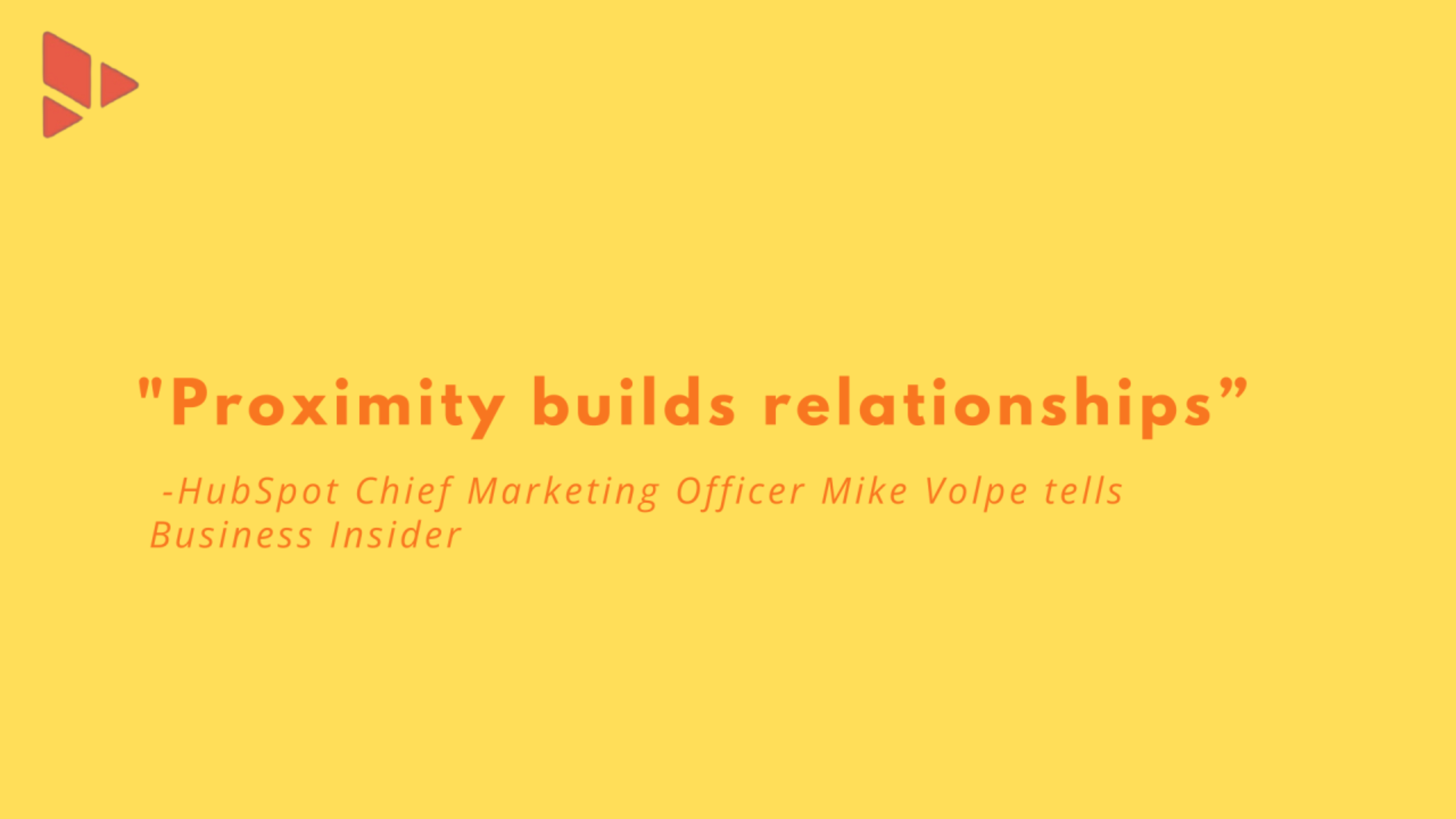
People should be able to learn from each other. So instead of having different rooms for sales, marketing, and engineering everyone works together.
Remarkable
Striving for remarkability means aiming to make a significant impact in everything HubSpot does. HubSpotters believe in exceeding expectations, whether it's in creating products, delivering customer service, or fostering a workplace culture that attracts top talent.
Transparent
Transparency is what holds the other values together.
At HubSpot, this means open communication, they’ve an open door policy where anyone can access anyone else in the company and easy access to any information they need. This fosters trust within teams and with customers.
The Impact of HEART
It's not just the values themselves but how deeply they're ingrained. From hiring practices that look for these qualities in candidates to performance reviews that assess them, HEART is more than a guideline; it's a way of life at HubSpot.
Businesses are about people, and how you treat your people and your customers is what truly defines your success.
HubSpotters talking about the company culture
Here’s fragments from HubSpotters responding to what they love about the company culture:
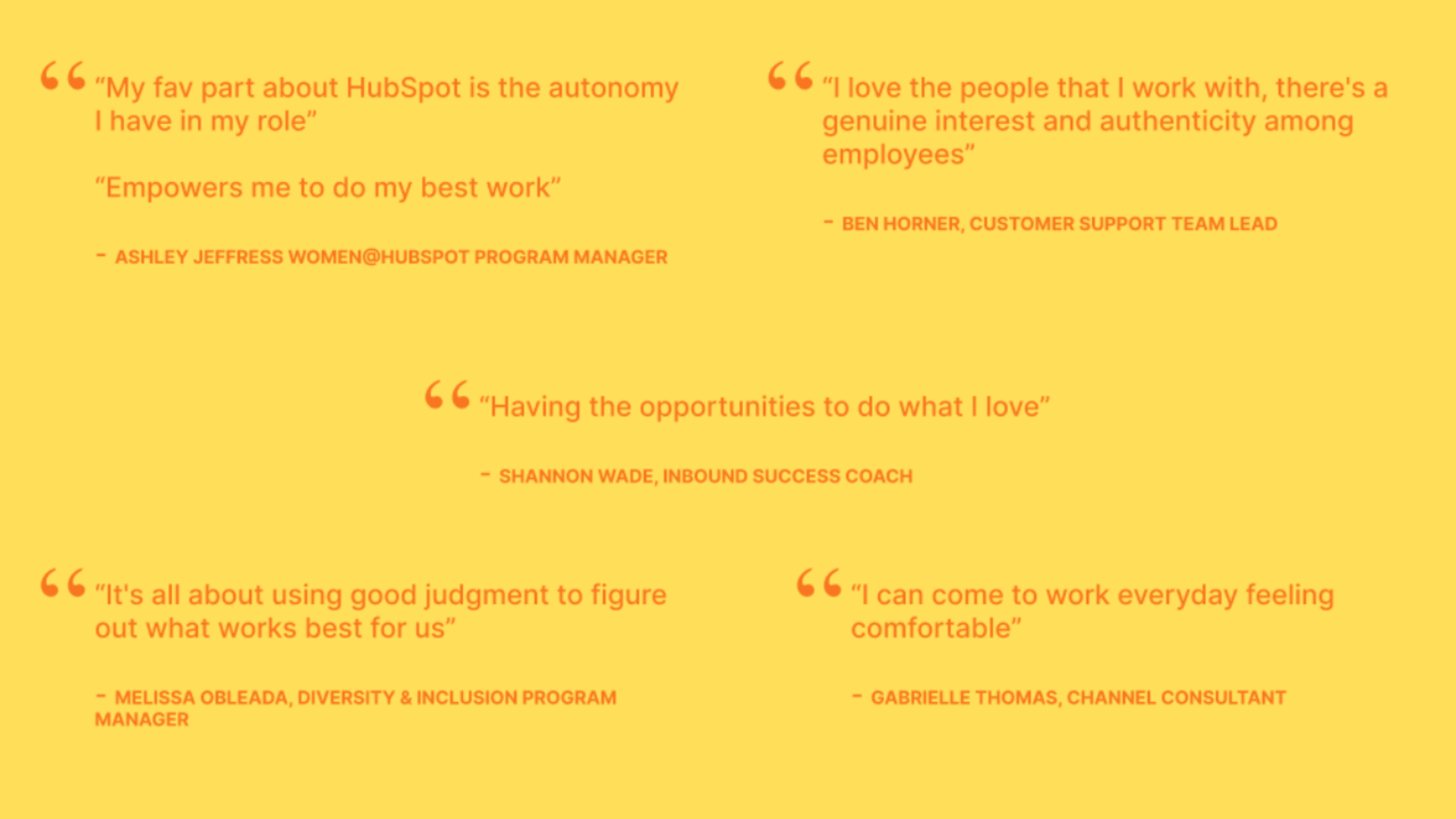
Here’s the video so you hear the complete thing from HubSpotters themselves (click on the image to watch the video)
To put everything to the ultimate test, MIT’s CultureX shows Hubspot’s rank in the internet industry and representation of how well 749 HubSpotters think the values are upkept.
Measuring Culture at HubSpot: Data & Initiatives

HubSpot measures culture quarterly in their employee survey. The employee feedback gives areas of improvement.
An employee survey....that's generic? Yes and multiple companies do it because you should. TINYpulse asks you to "raise your hand if you've ever ignored a survey" they've helped HubSpot and 1000+ companies do survey employees better. You know shorter surveys get more responses but here's an advanced TINYpulse guide on how to do them right.
In an interview with The Project Hustle Katie Burke, Chief People Officer at HubSpot said it's important to differentiate between skeptics and cynics. There’s a difference between “I’m sure, I’m not into this” and “I’m not too sure”.
HubSpot welcomes skepticism. People who question the things you’re doing keep you accountable for doing the right things. Not to say you should weed out all the cynics, the cynicism is usually short-term when someone’s going through something they might just need a little adjustment period.
Initiatives facilitating good culture
Once a year, HubSpot has a HEART Week, to exclusively celebrate and talk about their values. That sounds sweet, and there are more initiatives that uphold the values of the culture code.
Connect4: fostering personal connections in hybrid work
HubSpot’s Connect4, deepens personal connections among its team members working in a hybrid environment.
Connect4 stands for Purpose, Ease, Equity, and Sustainability connected together. Beyond the usual team-building exercises, this encourages employees to engage in one-on-one meetings with colleagues from different departments.
Radical Candor: the HubSpot way of feedback
Radical Candor makes the way feedback is delivered and received in HubSpot different. Coined by Kim Scott (author of Radical Condor) it challenges the norm of avoiding tough conversations in the workplace.
At HubSpot, this means encouraging open, honest, and direct communication, all while caring personally for the team members. No silent disagreements, employees are expected to be non dismissive and unhurtful when sharing feedback.
Breaks are as important as work done
HubSpot has an annual Week of Rest in early July. The company completely shuts down - no emails piling up, and no one’s working
How often do you change culture?
HubSpot treats company culture not as a static set of values but as a product that requires continuous iteration. This has led to the Culture Code being updated over 30 times. But why change so often? Dharmesh Shah, HubSpot's co-founder’s analogy is: just as software needs regular updates to stay relevant and fix bugs, so does company culture. This mindset ensures that HubSpot's culture remains adaptive and responsive to the needs of its employees, the market, and the broader community.
The Role of Feedback in Cultural Evolution
One might wonder, how does HubSpot decide when it's time for a change? The answer lies in the company's commitment to feedback.
HubSpot has cultivated an environment where feedback is not just encouraged; it's a cornerstone of their cultural evolution. This feedback-driven approach is how Shah identified a "bug" in the Culture Code: the need for empathy to be explicitly stated as a core value. This wasn't a top-down decision. It came from engaging with employees, understanding their perspectives, and recognizing a critical area for improvement. The change to include empathy as a core value, replacing 'Effective' in the HEART acronym.
This update was a direct response to the feedback from within, highlighting the importance of understanding and sharing the feelings of others, especially in a fast-paced, growth-oriented company.
Each iteration of HubSpot's Culture Code is a reflection of the company's journey, learning, and growth.
Why This Matters
First, HubSpot challenges the conventional wisdom that company culture is a fixed entity. Second, it shows the power of feedback in shaping a living, evolving culture that truly reflects the values and needs of its people. Lastly, it demonstrates that values like empathy are not just moral imperatives but strategic business assets that can drive growth, innovation, and employee satisfaction.
The balance is crucial
From the discussions from the HubSpot Culture Code Replay on the Human Capital Podcast by GoalSpan, changing culture too frequently can leave employees without a solid foundation to embody and represent.
The Philosophy of Iteration with Care
At HubSpot, the culture is iterated carefully to ensure that changes are meaningful and reflective of the company's core values and mission.
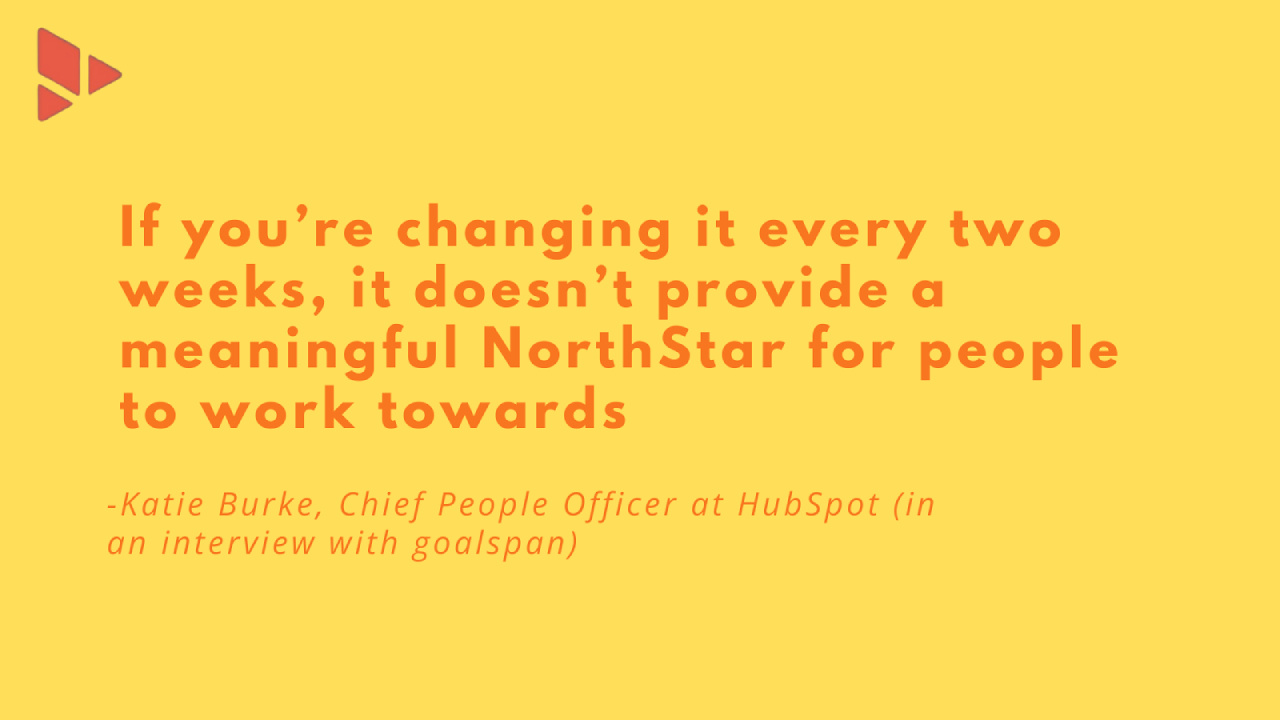
One of the most enlightening aspects of HubSpot's approach is the emphasis on making the culture a mirror of its employees' values and aspirations. This alignment ensures that the culture is not just a set of abstract ideals but a living, breathing entity that evolves with its people.
In the end
For companies looking to emulate HubSpot's success, the message is clear: culture is not a set-it-and-forget-it aspect of your business. It requires investment, attention, and most importantly, a willingness to evolve.
What sets HubSpot apart isn't just the high employee satisfaction. It's their methodical approach to culture, treating it with the same rigor as product development. This means regular updates, feedback loops, and metrics to gauge success. It's a living, breathing entity that adapts to the needs of its employees and the market.
